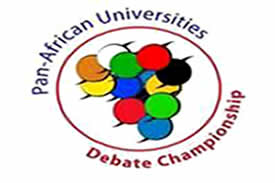Southern African Universities Win Top Slots in Team Events at 6th Pan African Universities Debate
Uncategorized December 11, 2013 admin
From: Diana Okon-Effiong, Calabar
The 6th Pan African Universities Debate Championship ((PAUDC-2013) ended in Calabar Sunday with South Africa’s University of Cape Town’s team A emerging champions in the week long event
Our correspondent reports that the championship involved participants from universities in about eight African countries and had as its theme “Conflict, Insecurity and Good Governance in Africa’’.
The contingent from the University of Botswana’s team B and team A respectively won the second and third place while the fourth position went to team A, Tshwane University of Technology, South Africa.
Certificates and trophies were presented to participating universities and contestants at the championship were first prize winners got $1,000, second prize ($500) and third place ($250).
Awards were also presented to in Top Adjudicators; Best Public Speaking;; Best Debaters as well as 1st, 2nd and 3rdprizes Debate categories at the closing ceremony.
In his remarks after announcement of prices by the Chief adjudicator, the Deputy Vice chancellor, Academics, University of Calabar, Prof Austine Obiekesie, said the institution was privileged to host PAUDC-2013
Earlier in his remarks Mr Ekpo Nta, the Chairman of Independent Corrupt Practises and Other Related Offences Commission (ICPC) said the championship was organised in conjunction by the commission.
Represented a t the occasion by Mohamed Ashiru Baba, a Deputy Director in ICPC, Nta, said that the Commission had been fighting corruption in the education sector.
He said the ICPC had designed “multi-level intervention to reduce systemic challenges in the education sector and improve its integrity profile’’.
Nta said: “Ensuring from ICPC’s intervention, allied infractions of regulations covering university systems were brought to the attention of the commission by National Universities Commission (NUC).
“These are illegal degree awarding study centres which take entrepreneurial advantage of access deficiencies into approved universities; and operations of unaccredited programmes and courses by approved institutions.
“The infractions constitutes fraudulent exploitations of students who are milked spending huge sum of money, time and effort to acquire certificates which are invalid for employment and further studies.
“In a decisive and simultaneous operation, the Commission sealed 67 illegal degree awarding establishments including those that claimed foreign affiliations without proof in diverse locations across the country.







